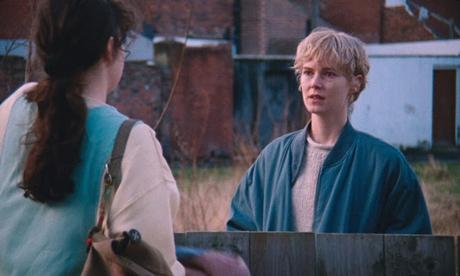
Set in Newcastle in 1988, Georgia Oakley’s Blue Jean is an extraordinary film. It centres on the titular Jean (an outstanding Rosy McEwen), a gym teacher, who lives a double life. She is a great teacher, seeing potential in and guiding frequently difficult to handle students. After work, she makes up excuses for why she can’t have a pint at the pub with her colleagues and instead goes out with her long-term girlfriend Liv (Kerrie Hayes) and their friend group to a local queer bar. The film makes it clear why these two spheres need to remain separate: in the car to work, she sees advertisement lining the road, she hears news reports of the debate on what would become Section 28 of the Local Government Act. Margaret Thatcher’s Britain is deeply hostile against her community, and the law targets her directly, outlawing the “promotion of homosexuality” and the “the teaching in any maintained school of the acceptability of homosexuality as a pretended family relationship”.
Much of the film’s scene set in the queer bar and in Liv’s share house ridicule the idea that the queer relationships depicted are anything but a family. We see the stark difference between what Jean experiences with her biological family: she appears to have cut off contact to her parents and her sister knows she is gay, but insists on keeping Jean’s wedding photograph on the mantle, as if she fondly remembers the time before, when Jean presented as straight and had longer hair. She insists on this in spite of Jean’s pleas to stop reminding her of what was clearly a difficult time in her life that she would prefer not to remember. When her sister brings around her nephew for babysitting, she later complains that Liv was present in the house, asking Jean to keep her private life a secret until a later time under the pretense of protecting the innocence of the five-year old, in spite of the fact that the scenes showing her gentle and caring interactions with him come across as more loving than what his own father provides for him. Compared to the strained political discussions at a party, repeated questions about potential boyfriends and an attempt to hook her up with one of the male teachers, her nightly excursions with Liv feel deeply liberating, like a weight is lifted from her shoulders and she can finally be herself. Her relationship with Liv, who isn’t attempting to pass as straight, is sound and supportive, even when she insists on keeping it separate from her working life. But the tension of the film comes from the walls closing in: as the discussions about Section 28 become more hateful, everything begins feeling like a menace, and it becomes increasingly difficult for Jean to maintain sane in the split world she’s been forced into.
The claustrophobia of the experience is perfectly translated into McEwen’s performance. When Liv calls her at school, it feels like an existential threat, even though it should be innocuous. The elderly neighbor accusingly watching all of her movements from her windows is a constant, eerie presence. But the breaking point happens in netball class, when she spots one of her new recruits, Lois (Lucy Halliday) at the queer bar. Lois, constantly bullied by the rest of the time but especially Siobhan (Lydia Page) who appears to be threatened by her, is a dangerous overlap between the two worlds – Jean fears that if she were ever outed at school, she would never be able to teach again. The tragedy is that isolated Lois, with nobody to turn to, desperately needs an adult to rely on. The film doesn’t delve very deeply into Lois’ life, since it is so centred on Jean, but it is clear that the community that Jean has found is the one thing that gives her support and joy, and that is exactly what Lois needs. Instead, Jean betrays Lois: she observes cruel Siobhan, setting Lois up by pretending to want to kiss her, and then claiming to be assaulted by her. Instead of telling the truth, she lies, anxiety rash rising on her chest, causing trauma and devastation for Lois.
The aim of the law is clearly to destroy the possibility of young queer people ever receiving the support they need in the very environments where they most often struggle. It is an attempt to undermine solidarity and care, to put teachers like Jean into a state of constant self-surveillance that makes it impossible for them to choose the welfare of their students over their own survival. It is deeply cruel (and horrifyingly timely, in light of what is happening in red states in the US). Jean’s decision to sell out Lois breaks her relationship with Liv, who makes the argument that they remind her of each other, that Jean has a responsibility that transcends her concerns for her job security. The part of the film set after their break-up is harrowing in its oppressive atmosphere. Jean looks like a trapped animal, separated from her community, incapable of forging a path forward. Suddenly she’s at the pub with her colleagues, right next to the teacher so desperate to date her. She tries to explain to Lois that she can’t be who Lois needs her to be, but at the same time it becomes clear that whatever life that leaves her with has had all the joy and meaning sucked out of it.
The glorious, surprising thing about Blue Jean is its ending: that it doesn’t end with utter devastation, that it believably navigates Jean to a different path. She breaks the rules and picks Lois up from her shift and drives her to Liv’s share house, to a birthday party. It’s pure queer joy (they dance and scream along with “Maggie Maggie Maggie Out Out Out”), and Lois delights in it, like she is walking through a portal into the possibilities of her future. It’s also the first time that she begins to understand Jean when one of the housemates explains to her that she, as a lesbian with a regular job and income, is supporting others in the community who need help through a communal bog fund. What Jean shows Lois is deeply defiant of the idea that anything about these relationships is “pretended”: in the face of ostracization and marginalisation, they are essential and life-giving.
2022, directed by Georgia Oakley, starring Rosy McEwen, Kerrie Hayes, Lucy Halliday, Lydia Page.

